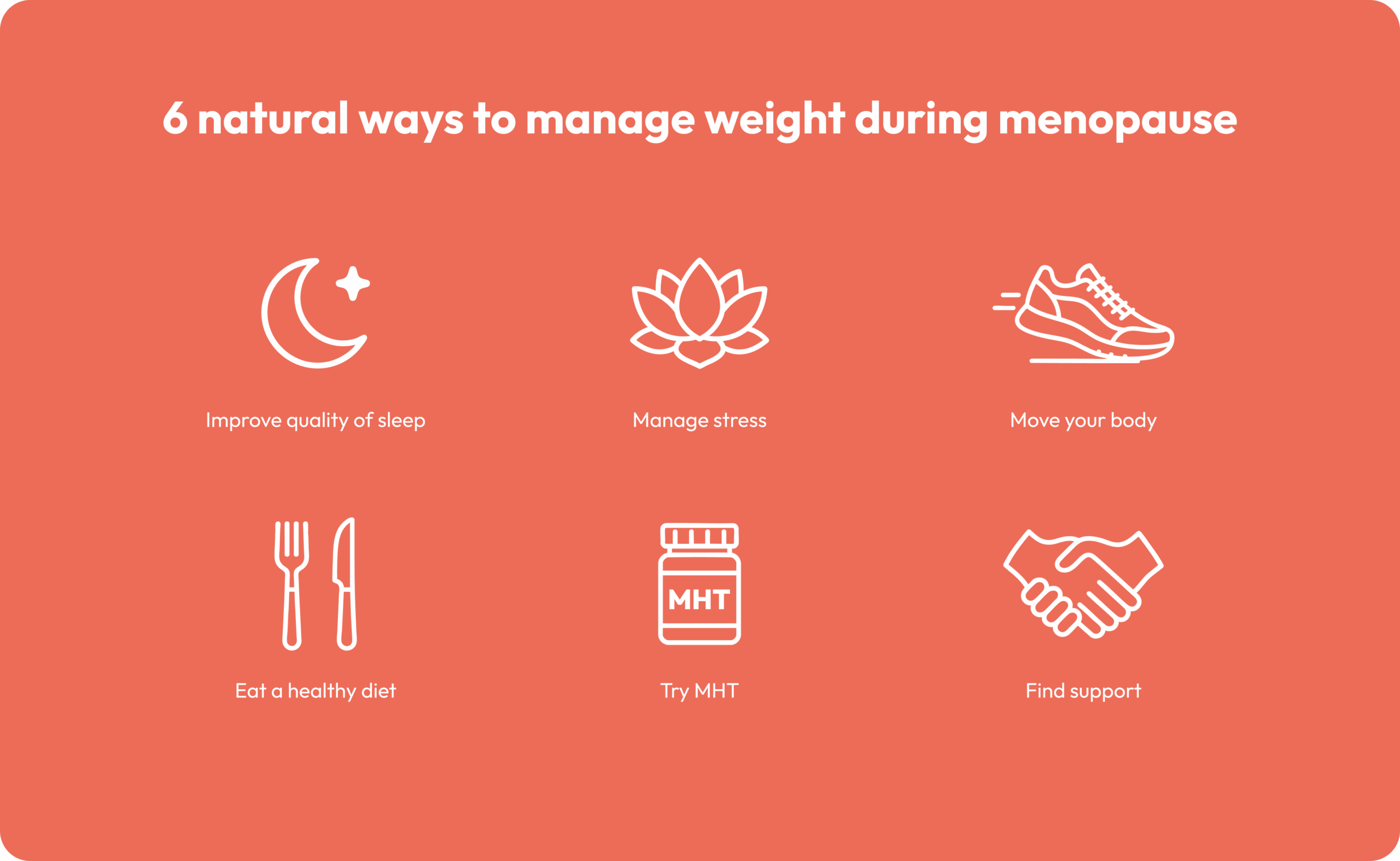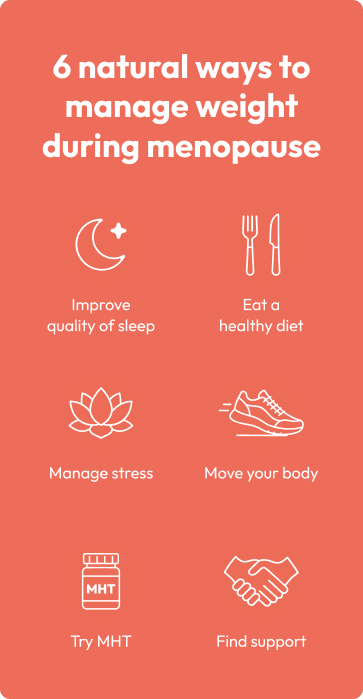Menopausal weight gain: Causes, symptoms, & treatments
Have you noticed your clothes fit differently, or you feel more bloated or softer in places that used to feel firm? You might even find that no amount of healthy eating or exercise seems to make a difference in your weight, despite your efforts.
For many women, these changes start showing up in their late 30s, 40s, or 50s, and it’s easy to blame stress, aging, or a slower metabolism. But what you might not realize is that hormonal changes that occur during this period of your life could be perimenopause or menopause, which can creep up and shift how your body stores and uses energy.
As estrogen and progesterone levels fluctuate, your metabolism naturally slows, muscle mass starts to decline, and fat tends to redistribute around the midsection. At the same time, changes in sleep, mood, and blood sugar balance can make cravings stronger and energy dips more frequent, creating the perfect storm for stubborn weight gain.
We’ll break down why these hormonal shifts, among other things, affect your weight and what you can do to support a steadier metabolism and a more comfortable relationship with your body.
What causes weight gain in menopause and perimenopause?
During perimenopause and menopause, estrogen and progesterone levels begin to fluctuate and eventually decline. These hormonal shifts affect how your body regulates fat, muscle, and energy.
Dr. Sheryl Ross (Dr. Sherry), Chief Medical Officer of Women’s Health at QuickMD, explains:
“Aging alone causes weight gain. On average, women will gain 1.5 pounds/year during their 50s and 60s. Weight gain is also accompanied by an increased tendency for central fat distribution -meaning abdomen, hips, thighs, and buttocks in women in midlife. The bottom line is if you continue to eat the same number of calories as you usually do, do not increase your physical activity and lose muscle mass with age… you are destined to gain weight.”
Beyond hormones, aging itself plays a role. Muscle mass naturally declines over time — a process called sarcopenia, which lowers your resting metabolism. That means you burn fewer calories, even at rest.
Sleep disruption, increased stress, and slower thyroid function can also add to the challenge, creating a “perfect storm” for gradual weight gain.
Even women who eat well and stay active often notice their bodies responding differently than before. The same diet and exercise routine that worked at 35 might no longer deliver results at 50, not because you’re doing anything wrong, but because your physiology has changed.
Health risks of weight gain in mid-life
A few extra pounds aren’t necessarily harmful, but where your body stores fat matters. During menopause, fat tends to shift from the hips and thighs toward the abdomen — what’s known as central or visceral fat.
Visceral fat isn’t just a cosmetic concern. It’s a biologically active tissue that releases inflammatory compounds and hormones that can raise the risk for:
- Heart disease and stroke
- Type 2 diabetes
- High blood pressure
- Certain cancers
- Increased risk of osteoarthritis
Maintaining a healthy weight and, more importantly, healthy body composition supports long-term vitality, bone strength, and metabolic health as you age.
Dr. Sherry notes, “Most women can handle the hot flashes, night sweats, insomnia, mood swings, anxiety, depression, fatigue, even low sex drive, but it is the weight gain that takes women to the edge of the cliff.”
This emotional toll is real. Weight changes can impact confidence, comfort, and quality of life, which is why approaching this issue with compassion is truly important.


How to manage weight gain
There’s no single fix, but small, steady changes can help you, including support from medical guidance.
Dr. Sherry explains, “Plain and simple, as we age it is harder for us to lose weight. The hormonal upheaval of menopause tends to make weight gain in the usual places—abdomen, thighs, hips and buttocks—a common complaint. That upheaval, along with aging, genetics and lifestyle choices, makes losing weight all the more challenging. Some believe that you need to eat 200 to 300 less calories to maintain your current weight once you hit fifty, but the main focus for women should be on eating a healthy, well-balanced diet, regular exercise, limited alcohol consumption, and sleeping 7-8 hours a night.”
Menopause hormone therapy (MHT)
Studies suggest that estrogen therapy may help prevent central fat gain in some women by improving insulin sensitivity and supporting lean body mass retention. Menopause hormone therapy (MHT) can help restore balance when your body’s natural estrogen levels drop. Lower estrogen affects how your body uses and stores energy, often leading to a slower metabolism and more fat collecting around the abdomen.
By replenishing estrogen, MHT helps your body work more efficiently. It can improve how your cells use energy, reduce fat accumulation around the midsection, and help preserve lean muscle. These changes make it easier to maintain a healthy weight and steady energy throughout the day.
While hormone therapy is not a weight-loss treatment, it supports the systems that influence weight and metabolism. For many women, it helps them feel more in control of their bodies and more comfortable in their own skin.
Though weight loss treatment during perimenopause and menopause, like GLP-1 medications have been shown to be an effective way to lose weight. Dr. Sherry shares, “GLP-1’s, in combination with hormone therapy, work best in managing and controlling unwanted weight gain during these normal hormonal transitions.”
Nutrition and metabolism support
Focus on balanced, whole-food meals that stabilize blood sugar and provide lasting energy. Include lean proteins (like fish, chicken, or tofu), high-fiber carbohydrates (like vegetables, beans, and whole grains), and healthy fats (such as avocado, olive oil, and nuts).
Research shows that women in menopause who follow a Mediterranean-style diet rich in plant foods, omega-3s, and antioxidants tend to maintain a healthier weight and lower risk for chronic disease.
During perimenopause and menopause, declining estrogen levels can contribute to insulin resistance, increased abdominal fat, loss of muscle mass, sleep disruption, and mood changes—all of which can make weight management more challenging despite healthy lifestyle efforts.
Hormone therapy with estrogen (and progesterone for women with a uterus) can help alleviate disruptive menopausal symptoms, improve insulin sensitivity, and reduce central fat accumulation, but it is not a weight-loss treatment.
Emerging research suggests that combining hormone therapy with GLP-1 medications, such as semaglutide or tirzepatide, can provide the missing weight-loss effect many women need during this transition. GLP-1s work by improving insulin response, regulating appetite, and supporting metabolic balance, making them especially effective for women who are already following a nutrient-dense diet, prioritizing protein, exercising regularly, and getting adequate sleep, yet still struggle to lose weight.
Movement and muscle maintenance
Exercise remains one of the most effective ways to counteract midlife weight gain. Strength training helps rebuild muscle mass, which raises your resting metabolism, while aerobic activity improves heart health and stress resilience.
If you’re short on time, even small bursts like 10-minute walks, resistance bands at home, or body-weight exercises can make a measurable impact when done consistently.
Sleep and stress management
Poor sleep and chronic stress elevate cortisol, a hormone that promotes fat storage, especially around the midsection. Prioritizing restful sleep, relaxation, and mindfulness are all aspects of metabolic health.
Struggling with weight gain? See how hormone therapy can address the hormonal changes that contribute to weight gain and slowed metabolism.
Hormonal changes during menopause can make maintaining a healthy weight more challenging, even when your habits haven’t changed. QuickMD doctors can help rebalance your hormones to support a steadier metabolism, renewed energy, and overall well-being.
We just launched our Menopause Hormone Therapy Membership in select states, and your first month’s on us. You’ll get to meet with a doctor, ask all your questions, and see if treatment might help.
If you love it and want to keep going, it’s $ 79/month after that, with special member pricing on medication and regular access to your doctor. And if you decide it’s not for you – that’s totally fine too. Get started by booking your free visit now.

